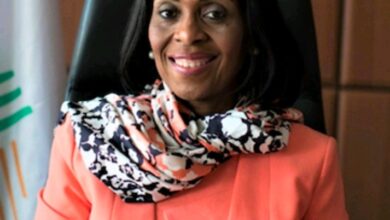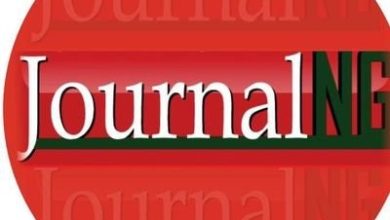Subsidy Removal: Petrol Price Rises to over N500 Across Nigeria as Fares Double
...Masses Groan over Difficulty to Get Product
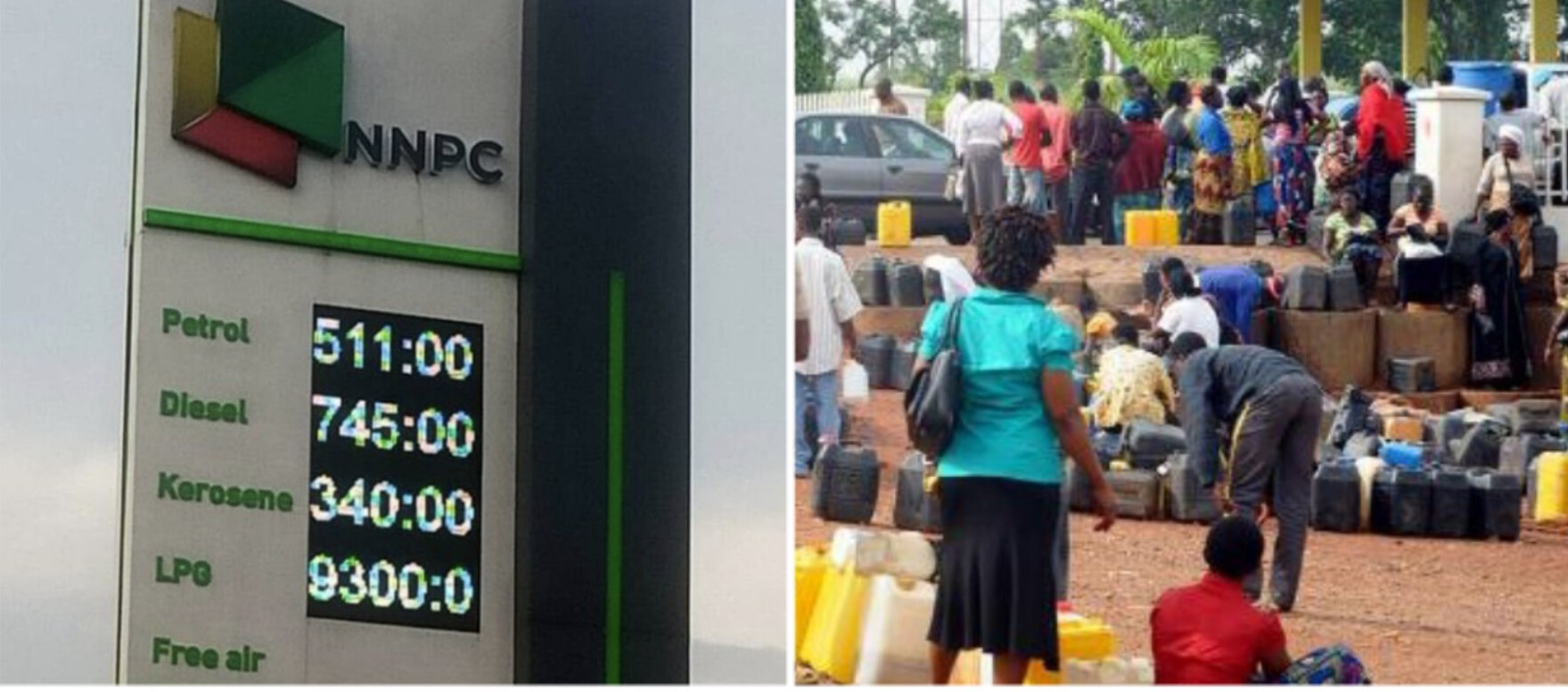
By Olamide Osho and Gloria Afajagbe
The Federal Government has finally removed subsidy on Premium Motor Spirit (PMS) popularly known as petrol as the Nigeria National Petroleum Company (NNPC) Limited officially changed its pump price across the country.
The new prices sighted by JournalNG, which take effect today, shows a change from 194 to N537 per litre in Abuja; 184 to N488 in Lagos, and 189 to N511 in Port Harcourt.
Other prices are N500, N511, N515, N520, N540, N545; with the highest being in the region of N550 and N557, which is more dominant in the North Eastern and North Western part of the country.
Checks in some parts of the country also showed that the NNPCL is already selling fuel at these prices in its stations, with other marketers expected to follow suit and adjust their own pump price.
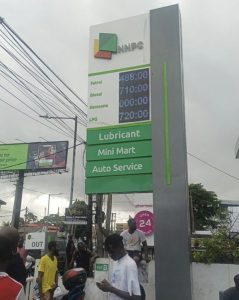
Nigerians, have however, been feeling the brunt of the fuel subsidy removal which cost the country almost $10 billion annually, even before the official price change by NNPC today.
President Bola Tinubu had during his inaugural speech, confirmed the removal of subsidy, which had earlier been announced by the Muhammadu Buhari administration.
Tinubu pointed out that the 2023 Appropriation Act did not provide for petrol subsidy beyond June; the end of the 18-month extension period approved by Buhari, for the discontinuance of the subsidy regime.
“On fuel subsidy, the budget I met before I assumed office and what I heard is that there is no provision for subsidy. Fuel subsidy is gone”, he said.
The development resulted in panic buying as long queues resurfaced across major cities. Some fuel stations hoarded the product, while others hiked the price from 195 to N600 per litre in many parts of the country.
48 hours after, commuters continue to experience an 100 per cent increase in fare prices for commercial buses and motorcycles, while it tripled in some areas, depending on the distance.
Usman, a motorcycle operator in Akesan, Igando area of Lagos told our correspondent that he bought a litre on Wednesday at the black market for N800, hence the increase in fare price.
“Yesterday, I bought it for N500 at the filling station, but today they are all closed. We couldn’t get fuel due to long queues in the stations that opened. I had no choice but to buy it in the black market for N800”, he explained to our reporter in Pidgin English.
A bus driver plying the Alimosho-Iyana Iba routes also disclosed that he bought the product for N500 on Wednesday morning at a fuel station around Iyana Ipaja.
When our reporter visited some of the fuel stations in the axis, he observed that majority of them were not selling.
At the Total station which had just received a tanker load of the product, the manager while addressing the crowd, informed them that it will be selling at the price of 185 to only vehicles and small jerry cans.
This move was in order to take hoarders and those in the black market business out of the equation, as the queue of vehicles alone, extended beyond the nearby Techno Oil fuel station and Olowonla bus stop.
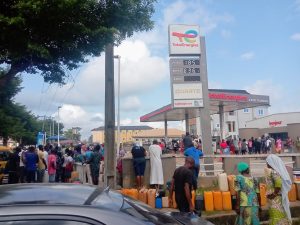
However, First Blefvic Petroleum before Igando bus stop had less crowd as it was selling for N400, despite having N210 displayed on its signboard. PM filling station at Isuti road, Igando sold for N550.
In Edo State, the price is also between 400 and 600 per litre. This is despite the warning issued by Governor Godwin Obaseki on Monday.
“All petrol stations are ordered to immediately resume sales of products to Edo people or risk immediate closure, and possible revocation of their property to enable others who want to do legitimate and respectful business in Edo State come and invest. We cannot continue to allow extortion of our people in whatever guise. A word is enough for the wise”, Obaseki had threatened.
When our correspondent visited some filling stations in the state on Tuesday, it was observed that many were closed to customers. The few that later opened up for business at about 6pm, increased pump price from N200 to N300 per litre, while others sold between N400 and N600.
MRS Filling Station at Agbor Road, which sold a litre at N300 naira Monday increased its price to N400, while Conoil was selling at N500.
Other filling stations such as NNPC Mega at Sapele Road and Madam 200 at Akpakpava Road, sold between N190 and N200 per litre witnessed long queues of motorists waiting to get the product.
A commercial driver, Jude Ezekiel told our reporter that most of the filling stations are selling at hiked prices.
“I went to MRS Filling Station that was selling N300 on Monday increased price to N400. Conoil Filling Station has increased price to N500. I bought fuel at N400 per litre”
Another driver who gave his name as Chinedu, decried the high cost of transportation, fuel and standard of living in Edo State.
On Wednesday morning, Rain Oil filling station at Ugbighoko, as well as NIPCO was selling at N510 with low turnout of customers.
Meanwhile, commercial drivers have increased transport fares by 50 and 100 per cent, depending on the routes.
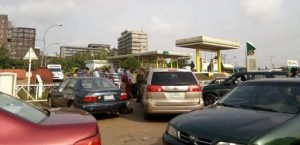
Further investigation by JournalNG revealed that the story is the same in most parts of the country, leaving the masses to groan in the face of the hardship. This is even as the full effect of the subsidy removal is yet to be felt.
To find a solution to the crisis, Tinubu had on Tuesday, met with the Group Chief Executive Officer of the NNPCL, Mele Kyari, Central Bank of Nigeria Governor, Godwin Emefiele at the Presidential Villa.
Kyari told State House Correspondents after the meeting that the Federal Government could no longer fund subsidy, pointing out that the government owed the company N2.8 trillion that it had spent on petrol subsidy.
“Today, we are waiting for them to settle up to N2.8tn of NNPC’s cash flow from the subsidy regime and we can’t continue to build this”.
Affirming the President’s stance, Kyari argued that the subsidy payment was no longer tenable as it made it difficult for the company to fund its core businesses.
He said: “Since the provision of the N6tn in 2022, and N3.7tn in 2023, we have not received any payment whatsoever from the Federation. That means they are unable to pay and we’ve continued to support this subsidy from the cash flow of the NNPC.
‘’That is when we net off our fiscal obligations of taxes and royalty, there’s still a balance that we’re funding from our cash flow. And that has become very, very difficult and affecting our other operations.
“We’re not able to keep some of this cash to invest in our core businesses. And the end result is that it can be a huge challenge for the company and we have highlighted this severally to the government that they must compensate and NNPC they must pay back an NNPC for the money that we have spent on the subsidy”.
Kyari said the reemerging petrol queues nationwide were understandable as marketers would like to understand the import of the president’s pronouncement that “subsidy is gone.” He said that the uncertainty over the remark also caused consumers to rush for the product, causing queues.
The NNPCL boss assured Nigerians that the government would initiate measures to cushion the effects of the subsidy removal.
Also, the Chief Executive Officer of the Nigerian Mainstream and Downstream Petroleum Regulatory Authority (NMDPRA), Faruk Ahmed, has said that the FG will not place any price cap on the sale of petroleum products in the country.
It disclosed this in a statement issued in Abuja by the General Manager, Corporate Communications, NMDPRA, Kimchi Apollo, stressing that there was an ample supply of PMS to meet demand.
Ahmed assured Nigerians that the company had over 30 days of PMS storage and supply, as he appealed to citizens not to indulge in panic buying. According to him, the company was also in discussions with the NMDPRA “to develop a framework of the implementation of the removal of the PMS subsidy as announced by the President”.
He further added that the company as the supplier of last resort, as mandated by the Petroleum Industry Act, would continue to ensure the availability of PMS and other petroleum products.
Ahmed further assured that the government will defend the interest of Nigerians by ensuring that no marketer takes advantage of them and license interested importers.
“With the removal of subsidy as pronounced by Mr President, this has opened the floodgate for any market or company that wants to import PMS. And we are ready to issue licenses for them. At least that will open the competition that will reduce the burden.
“And let me assure Nigerians that the NMDRA and the Federal Competition and Consumer Protection Commission will make sure that consumers are not taken advantage of. We intend to work together on this,” he said.
The NMDPRA stated that contrary to speculations and concerns, the announcement of the President was in line with the Petroleum Industry Act, of 2021, which provided for total deregulation of the petroleum downstream sector to drive investment and growth.
It added that there was no need for Nigerians to panic, as it was working closely with NNPCL and other key stakeholders to guarantee a smooth transition, avoid any disruption in supply, as well as ensure that consumers were not short-changed in any form.






